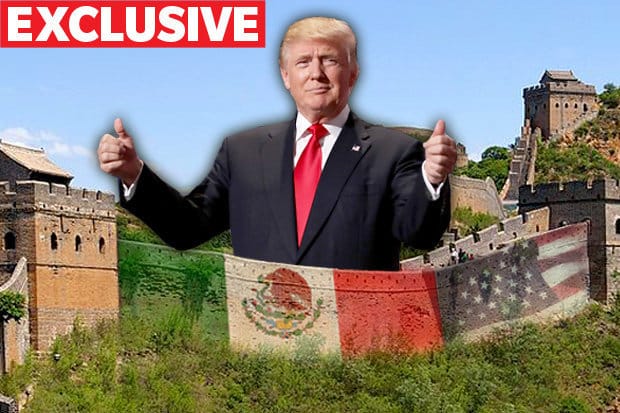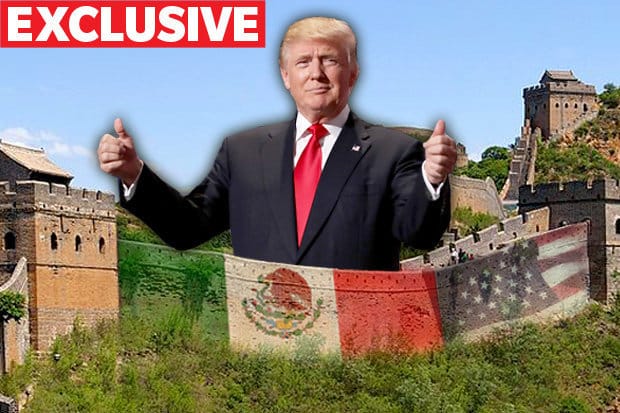Donald Trump is obviously a smart man. One cannot build up a billion-dollar financial empire without being smart.
Unfortunately, however, Trump is not so smart when it comes to some things, like the drug war. He thinks that simply by cracking down in the drug war and becoming more ruthless than previous presidents, he’s going to be the one who finally wins the war on drugs.
It’s not going to happen. No matter how smart he is in business affairs or even politics, Donald Trump will not win the drug war. That’s because no matter how hard he tries and no matter how much support he receives from Congress and the judiciary, no one can repeal the natural laws of supply and demand.
At the top of his list of things Trump intends to do to win the drug war is his much-vaunted wall along the U.S.-Mexico border, the one he thinks is going to keep out drugs (and illegal immigrants).
Here is why Trump’s wall and drug-war crackdown will never enable him to win the drug war.
At best, Trump’s measures will reduce the supply of drugs. What does that mean? Under the laws of supply and demand, that means a higher price.
What does a higher price mean? It means higher profits for those doing the supplying.
What do higher profits mean? They mean that more suppliers are going to be drawn into supplying drugs.
Like it or not, many, if not most, people like money. And most of the people who like money like more money as compared to less. More money enables them to do more things, such as pay for their children’s education, buy their spouse a new car, and go on nicer vacations.
When drug-war prices are soaring through the roof, people who would never seriously consider committing a felony drug offense are suddenly tempted to do so. For example, an ordinary law-abiding person would be much more likely to smuggle a package of cocaine into the country if he stands to make $250,000 than if he can only make $5,000. The risk of getting caught might be worth the higher amount but not worth the lower amount.
The Washington Post reported this week that 12 former and current TSA members and airport workers have just been indicted by a federal grand jury for conspiracy to smuggle cocaine into the country.
Why would federal law-enforcement personnel and airline employees engage in cocaine smuggling? Because of the money. Big money. One hundred million dollars to be exact. The Post article details how those 12 people allegedly smuggled tons of cocaine into the country.
How is Trump’s Wall going to prevent that? If his wall succeeds in reducing supply, that will only mean higher prices and profits, which will induce more TSA agents and airport personnel to take the chance at making a big score.
After all, what are the chances that a drug smuggler is going to get caught? Given the large amount of drugs that get through, I’d venture to say that the number of people who get caught is miniscule. Just think about the big financial reward for just one successful smuggling operation, and it’s not difficult to see why ordinary people take the chance.
Those 12 TSA workers and airline workers are not the only ones. There are also the government officials who take bribes to look the other way when drugs are being crossed over the border.
Notice something important here: All that the foreign drug sellers need is one border guard who is willing to take a bribe. The reason is obvious: If only one guard looks the other way, unlimited amounts of drugs can be smuggled at that border crossing.
Last December the New York Times carried an article on the bribery phenomenon. The article focused primarily on bribes to facilitate the smuggling of illegal immigrants, but obviously if border guards are willing to take money to look the other way on immigrant smuggling, there is a good chance they will also take money to look the other way on drug smuggling, especially if the amount of the money is extremely large.
Last month, for example, Johnny Acosta, a Customs and Border Protection officer in Douglas, Arizona, received an 8-year jail sentence for taking $70,000 in bribes for helping smuggle a ton of marijuana into the country. A TSA airport screener in Puerto Rico was recently accused of accepting $215,000 in bribes to facilitate the smuggling of drugs.
According to the NYT article, dozens of Customs and Border Protection officials have been charged with bribery. In 2016, 15 officials in the Department of Homeland Security were charged with bribery. A study of agency and court records “showed that over the last 10 years almost 200 employees and contract workers of the Department of Homeland Security have taken nearly $15 million in bribes while being paid to protect the nation’s borders and enforce immigration laws.”
How will Trump’s wall prevent bribery? It won’t and it can’t. The more his wall constricts supply, the higher will be the prices and profits, which will enable drug smugglers to pay even higher bribes, which will attract more officials to accept them in return for looking the other way.
Now, take a look at this fascinating catapult in an article from yesterday’s USA Today. What’s a catapult have to do with Trump’s border wall? It’s currently being used to fling bundles of marijuana over the current U.S. border fence that exists between the United States and Mexico. At the risk of belaboring the obvious, if it can do that to a fence, it can to it to Trump’s wall, unless, of course, he makes it 100 feet high. (Of course, there is also the tunneling problem, unless Trump makes his wall 100 feet deep.)
The only way that Donald Trump or anyone else can possibly win the war on drugs is by turning America into a total police state, with cameras in every room in every building in the country, including homes, as well as body cameras and mandatory daily drug testing for everyone in the country.
And even that still might not do the trick. Don’t forget: They can’t even keep drugs out of prisons.
Reprinted with permission from the Future of Freedom Foundation.



